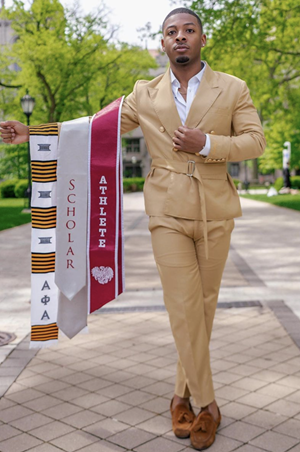“You never come into college thinking you are going to create an organization,” stated University of Chicago alum Demetrius “DJ” Johnson, Jr. “You just see there is a problem and try to find a long-term solution for it. That was what BLAC (Black Letterwinning Athlete Coalition) was, and still is today.
Johnson formed the first BLAC group on any UAA campus in 2020. After schools moving at different paces and a couple of starts and stops, this past fall marked the first time all eight Association schools had an active organization for Black student-athletes. As is standard with the autonomy UAA institutions value, the organizations have some differences in titles and membership, but all are led by a Black president and serve Black student-athletes.
THE BEGINNING AT UCHICAGO
“The summer of 2020 was a heavy and trying time for Black people. Innocent Black lives were being taken away due to improper police conduct. From going on a normal run, to walking out of stores, to being a bystander of a police invasion – as a Black person, it felt like we could be shot off this Earth at any point and time without a reason,” Johnson expressed.
Being that it was also the height of COVID-19 in the country, social media took on greater importance as a way for people to communicate their thoughts and feelings about what was transpiring before their eyes. “I saw how many universities were showing support for their Black athletes and athletic departments for their Black student-athletes. As a Black student-athlete myself, I loved how that solidarity seemed to be a non-trivial issue. Black people were dying – that’s that,” he pointed out. “However, UChicago was silent when it came to supporting the cause and I questioned if a statement would be put out in one of their more recent posts. Instead, the school continued to post content non-adjacent to the matter, overshadowing my concerns and those of other Black student-athletes on campus.”
That led Johnson to reach out to other Black student-athletes at UChicago to see if their coaches or teammates had shown them support in their time of need. “Most said that few, if any, others had reached out to show support. That’s when I felt something wasn’t right. Again, I never intended on creating an organization like this, but I saw a call for help from student-athletes who looked like me,” he explained. “The football team had fewer than 10 Black players on the roster, while some sports only had one. I believed an organization like this was a long time in coming, but it was the murders that summer that unified us as Black student-athletes.”

Johnson was looking for a strong and bold name for the fledgling organization. “I knew I wanted ‘BLACK’ to be at the forefront. Through trial and error with different names, I landed on the Black Letterwinning Athlete Coalition with the acronym BLAC,” he described. “With a coalition of current and former Black UChicago student-athletes rounded up, I created a group chat and Zoom sessions to draft a statement to express our concern with how UChicago athletics had not put out a statement of solidarity with its handful of Black students. For the longest time, many of us had experienced racism and microaggressions on the field and in the locker rooms and felt now was the time to express our long-suppressed anger. On June 2, 2020, we officially sent the statement to the athletic department and declared ourselves as the UChicago Black Letterwinning Athlete Coalition.”
WASHU FOLLOWS
Unknown to Johnson, Eka Jose and Caira Watson-Haynes of Washington University had been having similar discussions with their track and field teammates and alums from WashU. “Black athletes from WashU, a longtime rival of UChicago, reached out to me about starting a BLAC chapter there. We talked through it for hours on a phone call and shortly after, they established their chapter,” he recollected.
In addition to finding out about UChicago BLAC, Jose and Watson-Haynes reached out to others who had established similar groups. “We saw that USC (University of Southern California) had a Black student-athlete organization. I reached out to Anna Cockrell (a 2020 U.S. Olympian) from their track team on her Instagram and she graciously agreed to be on a call with me. Learning about their program and mission gave us a pretty good idea how to start and what to focus on,” Jose recalled.
“We looked at what other organizations, particularly at the Division I level, were doing in terms of outreach and social outings. Experiences in high school and at WashU helped us know what we wanted our organization to look like,” Watson-Haynes reported. “We know student-athletes have so many obligations, so we wanted to develop programs that we thought would be meaningful, like community service and networking with speakers from various career fields. Eka and I knew what we wanted and hoped others would want the same thing.”
Their gameplan was twofold, to become active stakeholders with administration and to bring together Black student-athletes from other teams at WashU. “In conversations with Caira and others, we noted a lack of integration with other Black student-athletes on campus. Being on the track team, you spend so much time with just individuals on the track team, while missing out on relationships with the school community and Black athletic community,” Jose noted. “You saw people from other teams, but just passed by one another. We even saw each other in the training room, but never spoke to each other. We wanted to bridge that gap.”

“In our conversations with each other on the team and past members of the track and field program, we saw we had a shared experience, the same challenges connected with culture and administration,” Watson-Haynes explained. “We decided that if we brought together Black student-athletes from all our teams, we would have more negotiating power to effect changes within the administration.”
In forming “WU BLAC,” as they named it, Jose and Watson-Haynes put together a set of initial goals as well as essentially a mission statement as to why they started the organization and the importance of developing such a group:
Why we started WU BLAC:
For much of Washington University’s history, Black student-athletes have been subjected to a less than desirable experience that has been propagated by not only the racial injustices we face as students at an institution with little diversity, but the microaggressions that are systematically rooted in the athletics program. While many of these acts have not been intentional, they have placed a large burden on Black student-athletes and lessened the voice and power we hold in the department. Black student-athletes are often commodified for the abilities they contribute to a team’s success, but that is not where our identity lies. We are Black before we are student-athletes. Until our identity as Black individuals is fully appreciated, we cannot be as successful as we can be in order to reach the maximum potential within our respective teams.
The Importance of WU BLAC:
WU BLAC is dedicated to empowering Black student-athletes at WashU by creating a community with a culture of personal growth and professional development in alliance with the athletic department and WashU as a whole. It is important that we intentionally create spaces for Black student-athletes to build community within their team, but also across various sports and various universities.
One thing they decided to do differently than UChicago was to have an executive board with people in charge of specific aspects of the organization. Now all eight schools have an executive board as part of their organization.

